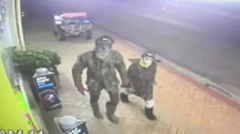**The tiny Caribbean island of Antigua is beset by a disturbing trend of unexplained disappearances, leading to anguish among families and calls for urgent action from authorities amid growing fears of crime and inadequate police resources.**
**Crisis in Paradise: Unraveling the Mystery of Disappearances on Antigua**

**Crisis in Paradise: Unraveling the Mystery of Disappearances on Antigua**
**Residents of Antigua grapple with an increase in unexplained disappearances, as families search for answers and justice.**
The island of Antigua is experiencing a troubling wave of mysterious disappearances that has left residents reeling and families desperate for answers. This worrying phenomenon, dubbed by some as an "epidemic," has seen at least nine individuals vanish without a trace in just the last two years, raising serious concerns among the local community and prompting questions about public safety.
One of the most heart-wrenching cases involves Patricia Joseph, who has spent six years searching for her mother, Hyacinth Gage, 74, who disappeared in May 2019 after visiting a public hospital for a routine check-up. Patricia vividly recounts the gut-wrenching pain of not knowing what happened to her mother, a lively woman who was wearing a bright orange raincoat the day she vanished. Despite extensive searches and investigations led by Patricia and her sister, no clues have emerged to explain her mother's disappearance.
Patricia's relentless pursuit of answers reveals a broader issue: missing persons cases on the island seem disproportionately high compared to neighboring regions. In contrast to St. Kitts, which has a comparatively low rate of unresolved disappearances, Antigua's small population of fewer than 100,000 people makes the growing number of missing individuals all the more alarming.
Families of other missing persons are beginning to unite, driven by grief and the urgent need for answers. Among them is Marina Bezborodova, whose son, Roman Mussabekov, went missing in May 2017 while vacationing on the island. As more families come forward with similar stories of loss, an urgent call for action is growing louder.
Speculations regarding the reasons behind these disappearances range from inadequate police resources to the possibility of sinister activities such as organ trafficking. Acting Police Commissioner Everton Jeffers has acknowledged there is “room for improvement” among his officers but insists they are not indifferent to the plight of the families involved. However, calls for a more robust investigative approach highlight deep-seated mistrust in local law enforcement, with families expressing frustration at the lack of communication and progress on their loved ones’ cases.
One case that shocked the nation was the disappearance and subsequent discovery of nine-year-old Chantel Crump, leading to outrage and protests over the handling of missing persons cases in Antigua. The revelations surrounding her case have further fueled fears that criminal activities, including organ trafficking, may be a contributing factor to the rising tide of disappearances.
Families are particularly troubled by the lack of a local forensic lab, resulting in critical delays in processing DNA evidence, which can hinder ongoing investigations. With new technological capabilities on the horizon, hopes are high among family members that future cases will be resolved more swiftly.
As community frustration grows, the government has responded with promises of new measures, including the establishment of a missing persons task force and training units to assist in searches. Yet, many are skeptical that these actions will lead to meaningful changes or sufficient answers in the face of an escalating crisis.
“I hope this doesn’t happen to someone close to them before they take a serious look at these disappearances,” Patricia emphasizes. With the pressing need for answers and justice, the island community continues to grapple with the mystery of the missing, determined not to let their loved ones be forgotten.
One of the most heart-wrenching cases involves Patricia Joseph, who has spent six years searching for her mother, Hyacinth Gage, 74, who disappeared in May 2019 after visiting a public hospital for a routine check-up. Patricia vividly recounts the gut-wrenching pain of not knowing what happened to her mother, a lively woman who was wearing a bright orange raincoat the day she vanished. Despite extensive searches and investigations led by Patricia and her sister, no clues have emerged to explain her mother's disappearance.
Patricia's relentless pursuit of answers reveals a broader issue: missing persons cases on the island seem disproportionately high compared to neighboring regions. In contrast to St. Kitts, which has a comparatively low rate of unresolved disappearances, Antigua's small population of fewer than 100,000 people makes the growing number of missing individuals all the more alarming.
Families of other missing persons are beginning to unite, driven by grief and the urgent need for answers. Among them is Marina Bezborodova, whose son, Roman Mussabekov, went missing in May 2017 while vacationing on the island. As more families come forward with similar stories of loss, an urgent call for action is growing louder.
Speculations regarding the reasons behind these disappearances range from inadequate police resources to the possibility of sinister activities such as organ trafficking. Acting Police Commissioner Everton Jeffers has acknowledged there is “room for improvement” among his officers but insists they are not indifferent to the plight of the families involved. However, calls for a more robust investigative approach highlight deep-seated mistrust in local law enforcement, with families expressing frustration at the lack of communication and progress on their loved ones’ cases.
One case that shocked the nation was the disappearance and subsequent discovery of nine-year-old Chantel Crump, leading to outrage and protests over the handling of missing persons cases in Antigua. The revelations surrounding her case have further fueled fears that criminal activities, including organ trafficking, may be a contributing factor to the rising tide of disappearances.
Families are particularly troubled by the lack of a local forensic lab, resulting in critical delays in processing DNA evidence, which can hinder ongoing investigations. With new technological capabilities on the horizon, hopes are high among family members that future cases will be resolved more swiftly.
As community frustration grows, the government has responded with promises of new measures, including the establishment of a missing persons task force and training units to assist in searches. Yet, many are skeptical that these actions will lead to meaningful changes or sufficient answers in the face of an escalating crisis.
“I hope this doesn’t happen to someone close to them before they take a serious look at these disappearances,” Patricia emphasizes. With the pressing need for answers and justice, the island community continues to grapple with the mystery of the missing, determined not to let their loved ones be forgotten.




















